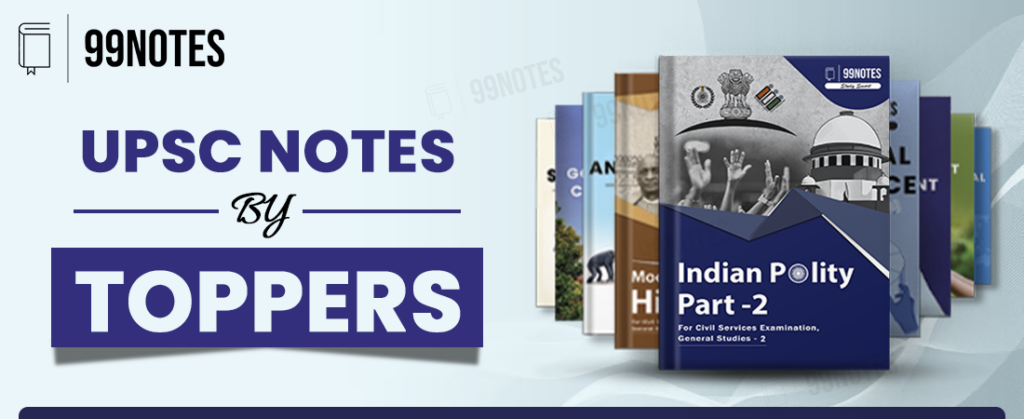
UPSC Notes by Toppers Free PDF
– Preparing for UPSC is Tough but not when you can prepare for UPSC Toppers Notes that are handwritten by Top IAS.
- We’ve create this page for all the UPSC aspirants preparing for UPSC Prelims, Mains or Optional. You will find all types of Notes here that are written by our team & optimised by UPSC toppers.
Bookmark this page right now & continue reading.
The candidates who are appearing for the UPSC exam or going to appear should take the reference from the UPSC toppers notes. The main aim for these notes is to provide the audience a better understanding to make their UPSC exam strategy better. These top ranker notes are well curated by us and highly beneficial for the UPSC aspirants. Here, on the Unacademy platform, we will be uploading the UPSC topper’s notes, so that the candidates can get all the required information at one page only. Get the access of the notes of these learners completely free with the help of below-provided download link.
UPSC, or the Union Public Service Commission, is one of the most prestigious and sought-after exams in India. Every year, lakhs of aspirants appear for this exam in the hopes of securing a government job. However, with the increasing competition and the vast syllabus, it can be challenging to crack this exam.
To help aspirants achieve their dream of becoming a civil servant, we have created a comprehensive UPSC study material that covers every aspect of the UPSC exam. Our study material is designed to provide aspirants with all the information they need to prepare for the exam in a structured and effective manner.
Our study material is divided into different sections, covering all the subjects that are part of the UPSC syllabus. These sections include:
General Studies 1: This section covers topics such as Indian History , Society, Geography
Our study material is not just limited to text-based content. We also provide diagrams, flowcharts, and mind maps to help aspirants understand complex concepts in a better way. Our diagrams are created using mermaid syntax, which is a simple and intuitive way to create diagrams using plain text.
General Studies 2: This section covers topics such as Indian Polity , Governance , International Relations
We understand the importance of quality content in search engine rankings, and we have taken all the necessary steps to ensure that our content is of the highest quality. Our study material is written by subject matter experts who have years of experience in teaching and preparing aspirants for the UPSC exam. We have also conducted extensive research to ensure that our content is accurate, up-to-date, and relevant to the exam.
General Studies 3: This section covers topics such as Indian Economy , Agriculture , Science & Technology , Environment , Internal Security.
To assist aspirants in realizing their dream of becoming a civil servant, we have meticulously crafted a comprehensive UPSC study material that encompasses every facet of the UPSC exam. Our study material is meticulously formulated to equip aspirants with all the essential information they require to prepare for the exam in a methodical and efficacious manner.
Our study material is classified into distinct sections, each encompassing subjects that are integral components of the UPSC syllabus.
General Studies 4: This section covers topics such as Ethics & Human Interface , Attitude ,Aptitude For Civil Services , Emotional Intelligence , Moral Thinkers & Philosophers , Civil Service Values , Ethical Issues In International Relations , Corporate Governance , Probity in Governance , Case Study on above Issues.
In conclusion, if you are an aspirant preparing for the UPSC exam, our study material can provide you with all the information and guidance you need to crack the exam. With our comprehensive study material, online coaching, and mock tests, you can prepare for the exam in a structured and effective manner. So, start your preparation today and take the first step towards achieving your dream of becoming a civil servant.
Why are UPSC notes by toppers so valuable & Whom to trust when finding IAS topper notes?
UPSC notes by toppers are considered valuable for many reasons.
- they are concise, covering the important topics and concepts for UPSC exam. Toppers often filter out the irrelevant information, providing aspirants with only the most important topics to focus on.
- These notes are written in a simple and easy-to-understand language, making it easier for aspirants to grasp complex concepts.
Moreover, handwritten notes by toppers contain valuable insights, tips, and tricks for clearing IAS Exam that can help aspirants streamline their preparation and avoid making mistakes that could cost them precious marks in the exam. - Aspirants who prepare from UPSC notes by toppers are at an advantage as they can avoid the confusion & information overload that often accompanies the use of multiple textbooks. 99notes is one of the most trusted place where you can easily find Toppers notes & it can help you save time and effort, allowing you to concentrate on revising and consolidating their knowledge.
Top 10 UPSC Civil Services Examination (CSE) toppers for the year 2015,2016,2017,2018,2019,2020 along with their respective ranks:
List of UPSC Civil Services Examination (CSE) toppers from 2015 to 2022
| Toppers Name | Year | Rank | Optional | Total Marks (out of 2025) |
| Tina Dabi | 2015 | 1 | Political Science | 1120 |
| Nandini K.R | 2016 | 1 | Kannada Literature | 1120 |
| Anudeep Durishetty | 2017 | 1 | Anthropology | 1126 |
| Kanishak Kataria | 2018 | 1 | Mathematics | 1121 |
| Pradeep Singh | 2019 | 1 | Public Administration | 1072 |
| Shubham Kumar | 2020 | 1 | Anthropology | 1072 |
| Shruti Sharma | 2021 | 1 | History | 1073 |
| Ishita Kishore | 2022 | 1 | PSIR | 1094 |
Here are some motivational tips from UPSC CSE toppers:
- Believe in yourself. The first step to success is believing that you can achieve it. Don’t let anyone tell you that you’re not good enough or that you can’t do it. Believe in yourself and your abilities, and you’ll be halfway there.
- Set realistic goals. Don’t set yourself up for failure by setting unrealistic goals. Start with small, achievable goals and gradually work your way up to bigger ones. This will help you stay motivated and on track.
- Create a study plan and stick to it. A well-structured study plan will help you stay focused and on track. Make sure to include time for both revision and practice.
- Take breaks. It’s important to take breaks when you’re studying. Get up and move around, or take a few minutes to relax and clear your head. This will help you stay refreshed and focused.
- Don’t give up. There will be times when you feel like giving up. But it’s important to remember that everyone experiences setbacks. Don’t let these setbacks discourage you. Keep going and you will eventually reach your goals.
Top 10 UPSC CSE Toppers of 2016:
| Rank | Toppers Name | Optional | Total Marks (out of 2025) |
| 1 | Nandini K.R | Kannada Literature | 1120 |
| 2 | Anmol Sher Singh Bedi | Economics | 1101 |
| 3 | Gopalakrishna Ronanki | Agriculture | 1091 |
| 4 | Saumya Pandey | Sociology | 1087 |
| 5 | Abhilash Mishra | Physics | 1084 |
| 6 | Kothamasu Dinesh Kumar | Electrical Engineering | 1082 |
| 7 | Anand Vardhan | Sociology | 1081 |
| 8 | Shweta Chauhan | Economics | 1076 |
| 9 | Suman Sourav Mohanty | Economics | 1075 |
| 10 | Bilal Mohi Ud Din Bhat | Physics | 1067 |
Top 10 UPSC CSE Toppers of 2017:
| Rank | Toppers Name | Optional | Total Marks (out of 2025) |
| 1 | Anudeep Durishetty | Anthropology | 1126 |
| 2 | Anu Kumari | Sociology | 1122 |
| 3 | Sachin Gupta | Economics | 1117 |
| 4 | Atul Prakash | Mathematics | 1117 |
| 5 | Pratham Kaushik | Economics | 1116 |
| 6 | Koya Shree Harsha | Anthropology | 1108 |
| 7 | Ayush Sinha | Geography | 1105 |
| 8 | Anubhav Singh | Public Administration | 1103 |
| 9 | Saumya Sharma | Anthropology | 1096 |
| 10 | Abhilash Baranwal | Chemistry | 1094 |
Top 10 UPSC CSE Toppers of 2018:
| Rank | Toppers Name | Optional | Total Marks (out of 2025) |
| 1 | Kanishak Kataria | Mathematics | 1121 |
| 2 | Akshat Jain | Philosophy | 1087 |
| 3 | Junaid Ahmad | Physics | 1083 |
| 4 | Shreyans Kumat | Public Administration | 1078 |
| 5 | Srushti Jayant Deshmukh | Anthropology | 1075 |
| 6 | Shubham Gupta | Anthropology | 1074 |
| 7 | Karnati Varunreddy | Mathematics | 1067 |
| 8 | Vaishali Singh | Sociology | 1067 |
| 9 | Gunjan Dwivedi | Mathematics | 1064 |
| 10 | Tanmay Vashistha Sharma | Sociology | 1064 |
Top 10 UPSC CSE Toppers of 2019:
| Rank | Toppers Name | Optional | Total Marks (out of 2025) |
| 1 | Pradeep Singh | Public Administration | 1072 |
| 2 | Jatin Kishore | Physics | 1063 |
| 3 | Pratibha Verma | Sociology | 1062 |
| 4 | Himanshu Jain | Mathematics | 1057 |
| 5 | Vishakha Yadav | Anthropology | 1057 |
| 6 | Ganesh Kumar Baskar | Geography | 1056 |
| 7 | Abhishek Saraf | Economics | 1055 |
| 8 | Ravi Jain | Sociology | 1054 |
| 9 | Sanjita Mohapatra | Chemistry | 1054 |
| 10 | Vishal Sah | Sociology | 1054 |
Top 10 UPSC CSE Toppers of 2020:
| Rank | Toppers Name | Optional | Total Marks (out of 2025) |
| 1 | Shubham Kumar | Mathematics | 1073 |
| 2 | Jagrati Awasthi | Physics | 1067 |
| 3 | Ankur Kaushik | Public Administration | 1062 |
| 4 | Ananya Das | Sociology | 1059 |
| 5 | Anmol Jain | Geography | 1056 |
| 6 | Vishal Sah | Sociology | 1056 |
| 7 | Ajit Kumar Yadav | Physics | 1054 |
| 8 | Abhijit Kumar Sinha | Economics | 1054 |
| 9 | Shikha Goel | Sociology | 1053 |
| 10 | Arushi Mishra | Political Science | 1052 |
UPSC Toppers Strategies
Tina Dabi’s IAS Exam Strategy: A Guide for Future Aspirants
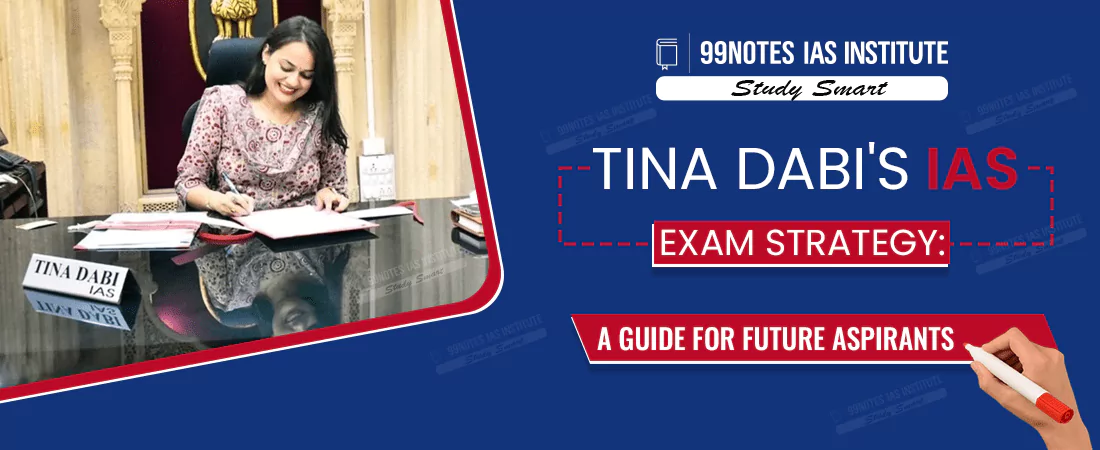
Tina Dabi, the young and dynamic IAS topper of 2015, has become a source of inspiration for millions of IAS aspirants across the country. Her strategic approach and disciplined preparation played a crucial role in her success. This article delves into Tina Dabi’s IAS exam strategy and her suggestions for future aspirants.
Early Start
Tina Dabi started her IAS exam preparation early. She began preparing for the exam while she was still in college. Starting early gave her ample time to understand the exam pattern, syllabus, and develop a solid preparation strategy.
Choosing the Right Optional Subject
Tina chose Political Science and International Relations as her optional subject. Her interest in the subject and its overlap with the General Studies papers were the main reasons behind her choice.
Comprehensive Study Plan
Tina followed a comprehensive study plan. She divided her time effectively between the General Studies papers and her optional subject. She also dedicated sufficient time for revision and solving previous year question papers.
Regular Newspaper Reading
Regular newspaper reading was a crucial part of Tina’s preparation strategy. She read ‘The Hindu Current Affairs Analysis‘ daily to stay updated with current affairs and improve her understanding of various issues.
Mock Tests
Tina emphasized the importance of mock tests in her preparation. She regularly attempted mock tests to assess her preparation level, improve her answer writing skills, and manage time effectively during the exam.
Consistency and Discipline
Consistency and discipline were the keys to Tina’s success. She studied regularly and maintained a disciplined lifestyle throughout her preparation.
Suggestions for Future Aspirants
Tina suggests future aspirants to start their preparation early, choose their optional subject wisely, follow a comprehensive study plan, read newspapers regularly, attempt mock tests, and most importantly, stay consistent and disciplined.
Conclusion
Tina Dabi’s success in the IAS exam is a testament to her strategic approach, disciplined preparation, and consistent efforts. Her strategy and suggestions can serve as a valuable guide for future IAS aspirants. Remember, success in the UPSC IAS exam is a combination of smart work, hard work, and perseverance.
FAQ
Kanishak Kataria, IAS Exam Strategy: A Guide for Future Aspirants
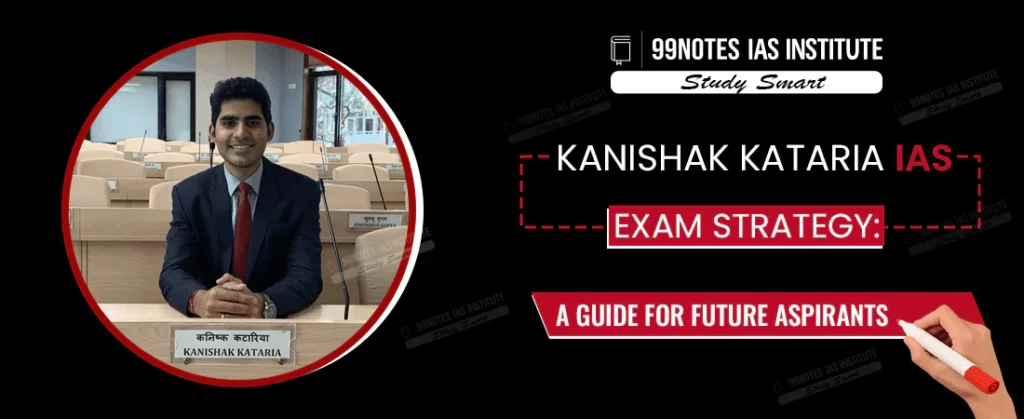
Kanishak Kataria, a name that echoes success in the UPSC Civil Services Examination (CSE), has become a guiding star for many UPSC CSE aspirants. His journey to becoming an IAS officer is a testament to his relentless determination and well-structured strategy. This article delves into Kanishak Kataria’s strategy for UPSC CSE and offers insights into his preparation tips and UPSC notes.
Kanishak Kataria’s approach to UPSC CSE was marked by a systematic study plan. He believed in the power of consistent study and revision. His advice for UPSC CSE aspirants is to focus on understanding the concepts rather than rote learning. He emphasized the importance of reading newspapers daily & Daily Current Affairs Analysis UPSC Exam Revision .
One of the key elements of Kanishak Kataria’s IAS strategy was his selective and intensive reading. He chose his study materials wisely and read them intensively. His success story is incomplete without mentioning his dedication to mock tests. He considered them as a tool for self-assessment and improvement.
Kanishak Kataria’s guide to UPSC CSE also includes maintaining physical and mental health. He encouraged aspirants to engage in physical activities and take regular breaks to avoid burnout. His journey is a shining example of how a balanced approach can lead to cracking the UPSC CSE.
In conclusion, Kanishak Kataria’s winning strategy for UPSC CSE is a blend of consistent study, understanding of concepts, selective reading, regular revision, and a balanced lifestyle. His journey provides valuable lessons and tips for all UPSC CSE aspirants.
Kanishak Kataria’s message for UPSC aspirants
Kanishak Kataria’s message for UPSC aspirants is one of hope and perseverance. He emphasizes the importance of self-belief and persistence in this challenging journey. His guidance for future IAS officers is to stay focused and not get disheartened by temporary setbacks.
He often shares his motivational words for UPSC aspirants, reminding them that the journey to becoming an IAS officer is a marathon, not a sprint. It requires patience, hard work, and the ability to stay motivated in the face of adversity.
Kanishak Kataria’s tips for UPSC success include maintaining a positive attitude, staying updated with current affairs, and practicing answer writing regularly. He believes that these elements, combined with a well-structured study plan and effective UPSC notes, can pave the way to success in the UPSC CSE.
FAQ
Anudeep Durishetty IAS Exam Strategy: A Guide for Future Aspirants
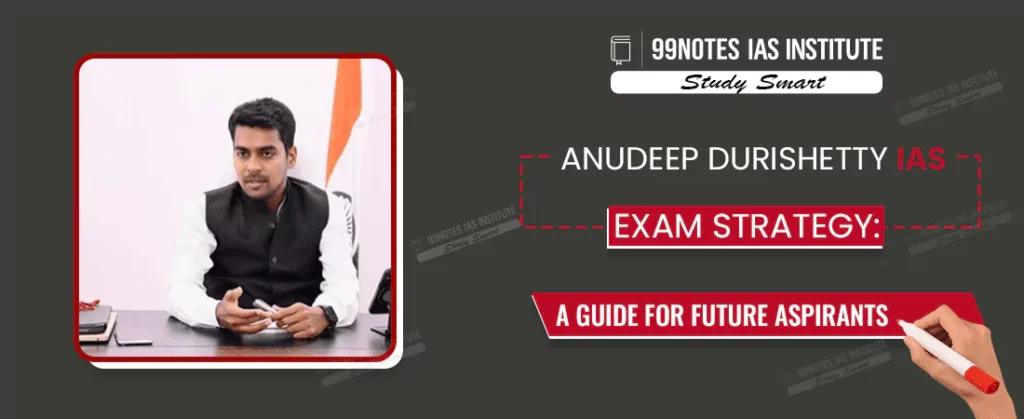
Anudeep Durishetty, a name synonymous with success in the UPSC Civil Services Examination (CSE), has become a guiding light for many UPSC CSE aspirants. His journey to becoming an IAS officer is a testament to his relentless determination and well-structured strategy. This article explores Anudeep Durishetty’s strategy for UPSC CSE and provides insights into his preparation tips and UPSC notes.
Anudeep Durishetty’s approach to UPSC CSE was marked by a systematic study plan. He believed in the power of consistent study and revision. His advice for UPSC CSE aspirants is to focus on understanding the concepts rather than rote learning. He emphasized the importance of reading newspapers daily for current affairs and making concise UPSC notes for revision.
One of the key elements of Anudeep Durishetty’s IAS strategy was his selective and intensive reading. He chose his study materials wisely and read them intensively. His success story is incomplete without mentioning his dedication to mock tests. He considered them as a tool for self-assessment and improvement.
Anudeep Durishetty’s guide to UPSC CSE also includes maintaining physical and mental health. He encouraged aspirants to engage in physical activities and take regular breaks to avoid burnout. His journey is a shining example of how a balanced approach can lead to cracking the UPSC CSE.
In conclusion, Anudeep Durishetty’s winning strategy for UPSC CSE is a blend of consistent study, understanding of concepts, selective reading, regular revision, and a balanced lifestyle. His journey provides valuable lessons and tips for all UPSC CSE aspirants.
Anudeep Durishetty’s message for UPSC aspirants
Anudeep Durishetty’s message for UPSC aspirants is one of hope and perseverance. He emphasizes the importance of self-belief and persistence in this challenging journey. His guidance for future IAS officers is to stay focused and not get disheartened by temporary setbacks.
He often shares his motivational words for UPSC aspirants, reminding them that the journey to becoming an IAS officer is a marathon, not a sprint. It requires patience, hard work, and the ability to stay motivated in the face of adversity.
Anudeep Durishetty’s tips for UPSC success include maintaining a positive attitude, staying updated with current affairs, and practicing answer writing regularly. He believes that these elements, combined with a well-structured study plan and effective UPSC notes, can pave the way to success in the UPSC CSE.
FAQ
Nandini KR IAS Exam Strategy: A Guide for Future Aspirants
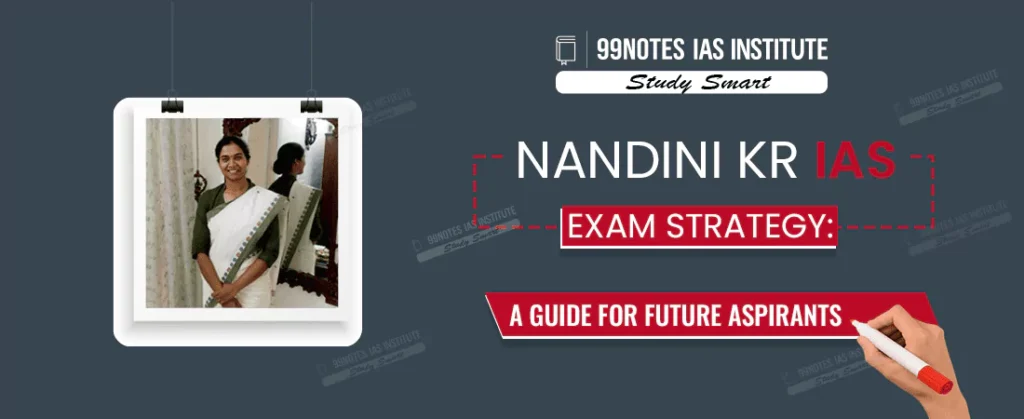
Nandini KR, a name that resonates with success in the realm of UPSC Civil Services Examination (CSE), has become a beacon of inspiration for many UPSC CSE aspirants. Her journey to becoming an IAS officer is a testament to her unwavering determination and well-planned strategy. This article delves into Nandini KR’s strategy for UPSC CSE and offers insights into her preparation tips.
Nandini KR’s approach to UPSC CSE was marked by a meticulous study plan. She believed in the power of consistent study and revision. Her advice for UPSC CSE aspirants is to focus on understanding the concepts rather than rote learning. She emphasized the importance of reading newspapers daily for current affairs and making concise notes for revision.
One of the key elements of Nandini KR’s IAS strategy was her selective and intensive reading. She chose her study materials wisely and read them intensively. Her success story is incomplete without mentioning her dedication to mock tests. She considered them as a tool for self-assessment and improvement.
Nandini KR’s guide to UPSC CSE also includes maintaining physical and mental health. She encouraged aspirants to engage in physical activities and take regular breaks to avoid burnout. Her journey is a shining example of how a balanced approach can lead to cracking the UPSC CSE.
In conclusion, Nandini KR’s winning strategy for UPSC CSE is a blend of consistent study, understanding of concepts, selective reading, regular revision, and a balanced lifestyle. Her journey provides valuable lessons and tips for all UPSC CSE aspirants.
Nandini KR’s message for UPSC aspirants
Nandini KR’s message for UPSC aspirants is one of hope and perseverance. She emphasizes the importance of self-belief and persistence in this challenging journey. Her guidance for future IAS officers is to stay focused and not get disheartened by temporary setbacks.
She often shares her motivational words for UPSC aspirants, reminding them that the journey to becoming an IAS officer is a marathon, not a sprint. It requires patience, hard work, and the ability to stay motivated in the face of adversity.
Nandini KR’s tips for UPSC success include maintaining a positive attitude, staying updated with current affairs, and practicing answer writing regularly. She believes that these elements, combined with a well-structured study plan, can pave the way to success in the UPSC CSE.
FAQ
Pradeep Singh IAS Exam Strategy: A Guide for Future Aspirants
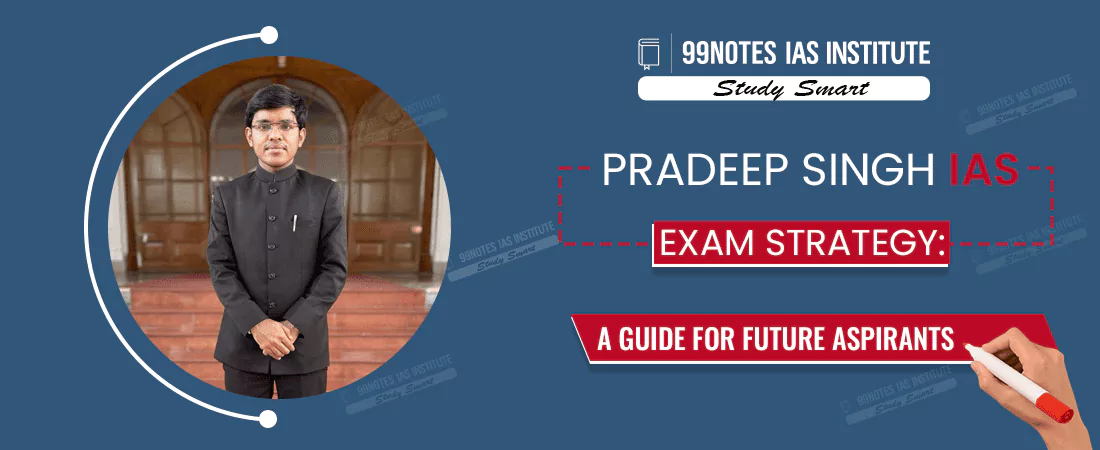
Pradeep Singh, a name that resonates with success in the UPSC Civil Services Examination (CSE), has become a beacon of inspiration for many UPSC CSE aspirants. His journey to becoming an IAS officer is a testament to his unwavering determination and well-planned strategy. This article delves into Pradeep Singh’s strategy for UPSC CSE and offers insights into his preparation tips and UPSC notes.
Pradeep Singh’s approach to UPSC CSE was marked by a meticulous study plan. He believed in the power of consistent study and revision. His advice for UPSC CSE aspirants is to focus on understanding the concepts rather than rote learning. He emphasized the importance of reading newspapers daily for current affairs and making concise UPSC notes for revision.
One of the key elements of Pradeep Singh’s IAS strategy was his selective and intensive reading. He chose his study materials wisely and read them intensively. His success story is incomplete without mentioning his dedication to mock tests. He considered them as a tool for self-assessment and improvement.
Pradeep Singh’s guide to UPSC CSE also includes maintaining physical and mental health. He encouraged aspirants to engage in physical activities and take regular breaks to avoid burnout. His journey is a shining example of how a balanced approach can lead to cracking the UPSC CSE.
In conclusion, Pradeep Singh’s winning strategy for UPSC CSE is a blend of consistent study, understanding of concepts, selective reading, regular revision, and a balanced lifestyle. His journey provides valuable lessons and tips for all UPSC CSE aspirants.
Pradeep Singh’s message for UPSC aspirants
Pradeep Singh’s message for UPSC aspirants is one of hope and perseverance. He emphasizes the importance of self-belief and persistence in this challenging journey. His guidance for future IAS officers is to stay focused and not get disheartened by temporary setbacks.
He often shares his motivational words for UPSC aspirants, reminding them that the journey to becoming an IAS officer is a marathon, not a sprint. It requires patience, hard work, and the ability to stay motivated in the face of adversity.
Pradeep Singh’s tips for UPSC success include maintaining a positive attitude, staying updated with current affairs, and practicing answer writing regularly. He believes that these elements, combined with a well-structured study plan and effective UPSC notes, can pave the way to success in the UPSC CSE.
Comprehensive UPSC Notes: Your Ultimate Study Guide for Success
Preparing for the UPSC Civil Services Examination is no small feat. With an overwhelming syllabus and a highly competitive exam structure, aspirants need well-organized resources to streamline their preparation. This is where UPSC notes come into play, serving as a simplified and concise way to cover a wide range of topics.
In this guide, we’ll explore how to create and use UPSC notes effectively, covering essential subjects from history and polity to current affairs. We’ll also discuss why these notes can be a game-changer for your UPSC exam preparation.
Why Are UPSC Notes Important?
The UPSC exam demands a comprehensive understanding of multiple subjects. Given the vastness of the UPSC syllabus, it’s easy to get overwhelmed. By organizing information into clear, concise notes, aspirants can quickly revise key topics without having to sift through textbooks repeatedly. Properly structured IAS notes can save time and enhance retention by summarizing large chunks of information into easy-to-digest points.
Creating Effective UPSC Notes
Creating UPSC notes requires a systematic approach. Here’s a step-by-step guide:
1. Understand the Syllabus
Before diving into note-making, it’s essential to understand the UPSC syllabus thoroughly. Knowing what topics are covered in each subject will help you create targeted notes that focus on important areas.
2. Organize Subject-Wise Notes
Break down your UPSC notes by subject. This allows for easy navigation and structured revision. Common subjects include:
- History: Focus on ancient, medieval, and modern history.
- Geography: Include physical, human, and economic geography.
- Polity: Make notes on the Indian Constitution, governance, and political system.
- Economics: Summarize key concepts like national income, budgeting, and financial systems.
- Current Affairs: Keep your notes updated with the latest developments on national and international fronts.
3. Use Diagrams and Flowcharts
Visual aids like flowcharts, diagrams, and mind maps are an effective way to summarize complex topics. For instance, using a flowchart to explain the structure of government institutions can make the information easier to recall.
4. Add Key Terms and Definitions
Incorporating key terms and important definitions into your UPSC notes helps reinforce the fundamentals. Focus on terms frequently asked in the exam, such as constitutional articles or economic indices.
Benefits of UPSC Notes
Quick Revision
UPSC notes offer a concise version of the vast syllabus, making them ideal for quick revision before the exam. You can go through your notes multiple times to reinforce the key points without spending excessive time on textbooks.
Better Retention
By summarizing complex topics into bullet points or diagrams, UPSC notes help in better retention. This is particularly useful during the final stages of preparation when revision needs to be quick yet comprehensive.
Personalized Learning
When you create your own UPSC notes, you’re not just passively reading—you’re actively engaging with the content. This makes learning more personal, aiding in better recall during the exam.
Conclusion
Creating well-organized, concise UPSC notes is one of the most efficient ways to prepare for the UPSC Civil Services Examination. Whether you are covering history, geography, economics, or current affairs, these notes will help simplify your study process. Make sure to regularly update your notes, especially for current affairs, and use them for quick revision before the exam.
Remember, UPSC notes are not just about summarizing information—they are about creating a tool that helps you master the syllabus in a structured and efficient way. Good luck with your preparation!
Frequently Asked Questions (FAQs)
